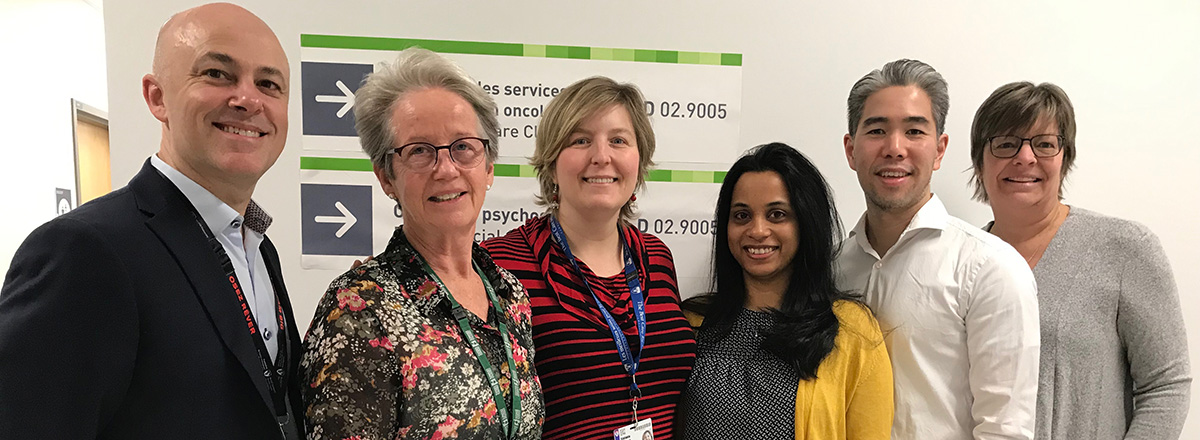An innovative approach in palliative care wins award
Canadian Foundation for Healthcare Improvement recognizes the MUHC team for a project that integrates palliative care sooner in a treatment plan

Left to right: Alain Biron, Dr. Carolyn Freeman, Dr. Stefanie Gingras, Nisha Almeida, Ben Sheih, Chantal Guevremont
The MUHC clinical pertinence team is one of only nine teams across Canada to be awarded support in the innovation category in the first "Minidefi" set up by the Canadian Foundation for Healthcare Improvement, an organization funded by Health Canada.
In November 2019, the project, the goal of which is to encourage MUHC health professionals to integrate palliative care early after a diagnosis of stage 4 lung cancer, was awarded $10,000 that will be used to assess stakeholder readiness. For Dr. Stefanie Gingras, a specialist in palliative care at the MUHC, this recognition is well-timed, as it confirms that there is a clear, global change of approach now underway.
"Studies show that patients who receive palliative or comfort care within the first 4 to 8 weeks after being diagnosed with advanced cancer see their lives extended and their quality of life improved." Too often, palliative care is offered late, a few weeks before the patient's death, when it could actually be used not only for the end of life, but also to relieve the adverse effects of chemotherapy, radiotherapy, or just cancer itself. "
Better understand everyone's concerns
The award will be used to support the collection of data through surveys and one-on-one interviews offered to specialist nurses and physicians and clinicians working in the emergency room, as well as through focus groups with patients and families in order to better understand the issues, concerns and the hesitations of each. The responses will be subjected to an analysis in order to design a pathway that corresponds to the needs of patients and families.
For Dr. Carolyn Freeman, who chairs the MUHC’s Clinical Pertinence Coordinating Committee, this first step is critical.
“We cannot implement solutions without understanding the issues. Right now, we're looking at feasibility and how we can implement this initiative. To do this, we want to identify the needs not only of patients, but also of clinicians so that they can improve care for these patients who may have a poor prognosis. "
By the spring of 2020, Dr. Gingras hopes that, upon diagnosis, the clinician responsible for the patient will propose a treatment plan that includes palliative care to support and improve the quality of life of the patient. The ultimate goal of the project is to set up a process which will encourage a more systematic way of offering the care needed.
"There are already some initiatives within the MUHC medical community, but we must work better together to harmonize our efforts," she concluded. "
Team members include in addition to Drs. Freeman and Gingras, Dr. Ben Shieh, a respirologist, Chantal Guevremont, a pharmacist, Dr. Alain Biron, Associate Director of Nursing at the MUHC, and Dr. Nisha Almeida, a Research Scientist and member of the MUHC’s Technology Assessment Unit that is supporting the project.

